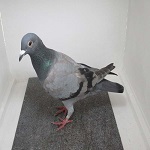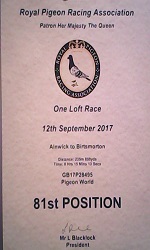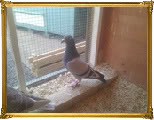| Countrywide Corns |  |
| Forum Syndicate 2019 | Pigeon World Forum Syndicate Bird takes 44th Place, in the 2019 RPRA One Loft Final.The Bird is Frans Zwol Bloodline, Bred and supplied by Darren Palmer (Oldstrain)  |
| Forum Syndicate 2019 | Pigeon World Forum Syndicate also takes 100th Place, in the 2019 RPRA One Loft Final. The Bird is Frans Zwol Bloodline, Bred and supplied by Darren Palmer (Oldstrain)

|
| Who is online? | In total there are 128 users online :: 0 Registered, 0 Hidden and 128 Guests :: 2 Bots None Most users ever online was 833 on Wed Nov 10, 2021 12:30 pm |
| Forum Syndicate 2017 | Pigeon World Syndicate Bird takes 81st Place in the 2017 Final Race, The Bird is Dia Evans Bloodlines and was Bred and supplied by Tumley Lofts Stud.  |
| R.P.R.A Certificate. | Pigeon World Forum Syndicate take 81st Place in the 2017 R.P.R.A. Final, with a Pigeon Bred and Supplied by Tumley Lofts Stud. |
| Top posting users this week | |
| Statistics | We have 1308 registered users
The newest registered user is Lee123
Our users have posted a total of 224427 messages in 14075 subjects
|
| Oldstrain/Darren`s Winner of winners. 2012. |  |
| From Fed Topper to Master Chef |  The N.E.H.U race from Melton Mowbray 21/4/2012 was won by Peel bros of South Shields, they took 1st club 1st fed, also taking 2nd and 4th club and 15 of the 25 birds clocked in the club......well done Peel brothers. The N.E.H.U race from Melton Mowbray 21/4/2012 was won by Peel bros of South Shields, they took 1st club 1st fed, also taking 2nd and 4th club and 15 of the 25 birds clocked in the club......well done Peel brothers. |
|
| | scherlaeckens |  |
| | | Author | Message |
|---|
IANYOUNG
Oldbird


Posts : 11428
Join date : 2009-03-30
Age : 61
Location : south shields
 |  Subject: scherlaeckens Subject: scherlaeckens  Tue Feb 16, 2010 4:43 pm Tue Feb 16, 2010 4:43 pm | |
| A growing problem
A growing problem
Recently scientist have alarming news about trichomoniasis (canker).
Canker is not a matter of viruses or bacteria but single celled pear shaped protozoan.
What the alarming news then is?
Some find it hard or almost impossible to eliminate the parasite due to an increasing immunity.
The problem may concern the whole loft or pigeons individually.
They treat and treat but fail to cure the bird(s).
And the tragic thing is we have to blame ourselves.
In the past we did not have that problem and the fact that we did not have the medicine either is food for thought.
When we got the medicine things went worse and worse, despite the fact that we medicated and medicated; before the breeding season, before the racing season, before the moult and sometimes every one or two days after every race.
And that is exactly the reason that we face this problem now.
We have undermined the immunity of our birds dramatically.
Sorry for the little one but it should go, regardless
the origin.
AND NOW?
What we can do now in case of problems is double the proportion of the medication but that will inevitably lead to bigger problems on a longer term.
Till the moment has come that the parasite just ‘laughs’ at any medicine.
Therefore my advice is to do the opposite: Medicate only if necessary.
I myself have the medication at hand (Ronidazole or metronidazole) but never ever will I treat birds that are in good shape.
2000 Was probably my best old bird season ever.
The whole year round the birds were in such a good shape that I did not see any reason to treat them.
So what I do now is restrict myself as much as possible
I will treat birds only if I feel the need to do so and I advise others to do the same.
I agree you need some experience for that but fanciers that do not medicate one day too soon nor one day too late are the people that we call ‘champions’.
In case you do not have the feeling and no good vet lives nearby you may ask what you have to watch out for.
Or, in other words, what are the symptoms of birds that suffer from canker how little it may be? Well, here we go.
SYMPTOMS
- Birds are depressed
- Babies in the nest have watery droppings with a sour smell and they are skinny.
- Birds appear listless, ruffled and dull.
- They have difficulty closing their mouth.
- They display repeatedly swallowing movements.
- They have no list to train, they eat little and drink much and their bodies do not feel tight, on the contrary.
But… if you see these symptoms in fact you are too late, since pretty much damage has been done already.
You should not let it come that far.
People sometimes say that champions see to day if a pigeon will get sick to morrow.
There is much truth in these words.
All champions are good observers, therefore they became champions and they act at the right time with the right medication.
If they fear they might have a problem soon they do not wait till there IS a problem.
The beak is a good indication and may teach you a lot.
If you open it and you see little threads at the back that means danger.
If you see there are grey slimes at the back you need to take action as well.
Furthermore a throat that is too reddish is also a warning.
Now you may understand that the first thing I do in case I doubt a birds’ health is open its beak.
And vets do the same!
SELECTION
Of course you can also select birds on canker.
What I mean is eliminate those that are vulnerable and keep the others, but this is not without risks.
Since good pigeons are vulnerable as well you may end up having a family that will not easily get canker but that are unable to perform since they lack quality.
Therefore one should select both on results and natural health rather than on eye sign or pedigree.
Finally it is very important that in case you do medicate, you treat all the birds, Some do not want to waste money and medicate the widowhood cocks that they race only and not their hens.
That is a big mistake. If pigeons are not free from canker the hens will immediately infect the cocks again.
This happens when they mate or through the drinker, |
|   | | IANYOUNG
Oldbird


Posts : 11428
Join date : 2009-03-30
Age : 61
Location : south shields
 |  Subject: Re: scherlaeckens Subject: Re: scherlaeckens  Tue Feb 16, 2010 4:48 pm Tue Feb 16, 2010 4:48 pm | |
| Questions without answers
A problem for people like me who are writers and also race well is that others suspect us of knowing all about pigeon sport.
And therefore fanciers ask us questions.
But the truth is not others nor I know all the ins and outs of our sport.
Naturally questions like the following that I got from a South African fancier I cannot answer and do not want to answer either:
He wrote:
‘Can you tell me in detail how you feed your birds, how you train and motivate them, about your breeding methods, the way you select birds and your medical guidance the whole year round.’
It is a shame I cannot answer questions like this because:
- It would take me too much time.
- Circumstances in South Africa are quite different from ours.
- There is not such a thing as the ultimate one and only way to success; there are many roads to Rome.
TOSSING, FEEDING
Many questions I get from foreigners are about tossing, feeding and darkening.
They believe in tossing and maybe they are right.
Most champions in Holland and Belgium however do not toss at all during the racing season, since they found it does not make sense.
Why may it be useful for others and is it a waste of time here?
Here fanciers live close to each other, so after the release all birds fly in the same direction (at least for a while) and the countryside is flat without water, woods or mountains.
Therefore our birds do not need ‘to break’ like in other countries where fanciers live far apart and the birds do have to overcome these difficulties on their way home.
To give foreigners advice about feeding is hard as well, since most food mixtures we have are not available abroad and the climate and racing methods differ.
Fanciers that live in countries with a warm climate should feed differently from us.
Fanciers that race their birds twice a week or toss them nearly daily should feed differently as well.
DARKENING AND LOFTS
For reasons mentioned before I cannot advise nor I can answer questions about darkening either.
We do not only have different hours of daylight but the way you should darken your young birds (today also old birds) also depends on the racing program.
By darkening our ‘winter breeds’ the way we do the small feathers are renewed, while the flights are not.
Thus we can race youngsters with a full wing at the time they normally should moult.
What I can say is that you should have 10 hours of daylight maximum and young birds normally get into good shape 3 weeks after the darkening is lifted.
Today most fanciers here also put on the lights from the end of June till the end of the season.
At the end of June the days get shorter and less daylight means the moulting process starts and the condition of the pigeons gets down.
By preventing the days from becoming shorter you keep up the condition and birds do not moult.
Then there is the loft climate which is one of the most important items in this sport to be successful.
The climate inside the loft depends very much on weather circumstances outside.
Thus it is quite well possible that a loft that is good in Holland and Belgium would kill the condition if it were a loft in other countries.
The opposite is also true: A good loft in a tropical area is much open which would kill the health of the birds here.
WHY?
Why, one may wonder, do birds moult at certain periods of the year?
Of course they do not know if it is March or September.
But it is the days that get shorter (or longer) that influences the moulting process.
One should know that birds that moult or start moulting do not perform and as I said the moulting process has everything to do with the length of the days.
This year, we in Holland, had very cold weather in February and March.
In fact it was colder than in November and December.
Despite the cold birds started building their nests in those 2 spring months.
That was because the days got longer, which caused a kind of euphoric effect.
For the same reason the condition of pigeons gets better about 3 weeks after the darkening is lifted.
It seems that birds get happier in spring; they begin to sing, mate and build nests while in fall when the days get shorter they become calm.
So now you may understand why most champions here switch on the lights at the end of June after the longest day.
But… the longest day here is not the longest day in say, for argument’s sake, South Africa or California.
Manipulating light and dark can be the difference between winning and losing but, if you want to imitate champions here one should live in Holland or Belgium!
MEDICATION
Many questions are about medication.
Some people even ask about a good medicating program the whole year round.
My question is ‘why medicate if birds are not sick?’
To make them healthier and win races?
Come on!
If you have say 50 birds and 3 of them get sick, get rid of those 3.
When 3 students in a class get a head ache you do not give all their class mates aspirin either.
VACCINATING AGAINST SALMONELLA
Vaccinating against salmonella is wrong.
If there are problems the birds should be cured for a day or twelve, if the problems are real serious a vaccination may follow.
One should know some vaccinations are hard on the birds and the one against salmonella is one of them.
Some claim that after a vaccination birds get a boost in condition and are less vulnerable for Adeno/Coli.
This is a misunderstanding.
If you think that the birds are infected take a bird of no value from the loft and vaccinate it. If it gets real sick you have reason to worry.
As for other vaccinations one should know they are meant to prevent the birds from getting infected.
To heal birds that suffer from some disease one should cure!
IN CONCLUSION
Your best teacher is you yourself.
The birds tell you if you did the right thing or not.
But there is one condition:
You need to be a good observer in order to see what the birds might teach you!
Being a good observer is the most important quality of a successful pigeon man anyway. |
|   | | IANYOUNG
Oldbird


Posts : 11428
Join date : 2009-03-30
Age : 61
Location : south shields
 |  Subject: Re: scherlaeckens Subject: Re: scherlaeckens  Tue Feb 16, 2010 4:50 pm Tue Feb 16, 2010 4:50 pm | |
| Too boost or not to boost?
An American fancier had heard from a fellow country man that you can boost the condition of the birds before a race if you vaccinate them against salmonella.
It was said some Europeans do the same.
I know that ‘fellow country man’.
He used to race in Holland but moved to another province since his results were ‘too poor to be true’.
What he did then was pulling out all 12 feathers of the tail; thus the birds would be freed from paratyphoid, he said.
How stupid some people can be.
TRUE AND NOT TRUE
It is true that vaccinating against salmonella in between the races was a kind of hype some years ago.
It was a kind of hype, so fanciers imitated each other but found it was no use at all.
Some even vaccinated against pox during the season and the idea was the same; the live virus was supposed to activate the immune system and thus boost the condition.
Now (most) fanciers know better.
Those vaccinations are absolutely useless.
Some fanciers claim (there was even a vet among them) that after a vaccination against salmonella the risk of an outbreak of Adeno is reduced.
This has also proven not to be true.
WHAT TO DO?
I personally consider paratyphoid as big a problem for our birds same as canker.
What about vaccinating outside the season then?
This subject is controversial.
Some vets advise to do so, however most of them are against it.
What they ALL agree on is that you can only vaccinate after a cure of at least 12 days.
Altabactine was an antibiotic that was superior to others but is forbidden now.
If one gram of it is found at a vet’s place he will get in big trouble.
But there are alternatives which also work.
Personally I treat all my birds every winter for 12 days. After that they are NOT vaccinated. Others also treat before the season and are successful.
The reason that I give a cure is that I just do not want to take chances. I handle many birds of other fanciers and can hardly imagine that in case I have 80 birds there is no carrier of the harmful bacteria among them.
Fanciers whose birds have proven to be infected however should vaccinate them but ALWAYS after a cure of at least 12 days.
The best thing to do then is use an auto vaccine, since there are many families of the bacteria, thus you enhance chances to hit the right family.
Unfortunately no vaccination will give you a 100% guarantee, not even against paramyxo.
Furthermore one should know the vaccination against paratyphoid is hard on the birds and therefore they should only be mated at least 6 weeks later.
Pretty many fanciers ruined their breeding season by mating up the birds too soon after vaccination.
If you doubt if there is salmonella among your birds there is a simple way to find out if that is the case.
Just vaccinate some birds, if they fall very sick you have reason to worry.
FINALLY
Many fanciers do not know the difference between vaccinating and curing (I mean medicate the birds with antibiotics).
It is simple:
- You vaccinate healthy birds in order to prevent them from an infection.
- You cure sick birds in order to heal them.
So vaccinating birds during the season in order to boost the condition?
Just forget it.
You can boost the condition by manipulating with cold and heat (pretty difficult in many countries) and light and dark, which is easier!
(C) A Schaerlaeckens
p.s.
Elton Dinga USA and Mike Hopman from the Netherlands are a great help to update you with new articles! |
|   | | IANYOUNG
Oldbird


Posts : 11428
Join date : 2009-03-30
Age : 61
Location : south shields
 |  Subject: Re: scherlaeckens Subject: Re: scherlaeckens  Tue Feb 16, 2010 4:51 pm Tue Feb 16, 2010 4:51 pm | |
| Not smart
A fellow sportsman had a problem.
Suddenly his 6 week old birds fell sick; Adeno/coli as it seems.
Unfortunately this infection can attack at any loft at any time but in this case the fancier was to blame.
He had just vaccinated his birds against paratyphoid, which is a big mistake.
Those birds were too young to vaccinate, even a vaccination against paramyxo should be avoided at that age.
Any vaccination causes stress which opens the gate for Adeno/coli.
TOTALLY WRONG
Should birds be vaccinated against salmonella anyway?
Vets do not agree.
One is in favour of it, the other is against it.
But they all agree this should only be done after a treatment with antibiotics for at least 10 days. Needling them without such a cure before is wrong.
As a matter of fact most vets advise to only vaccinate if there were/are problems with salmonella.
Some time ago there were fanciers who wanted to save work and time and practised a combined vaccination against pox and paramyxo, or pox and paratyphoid or even the 3 of them at the same time.
But they have become wiser, it is too hard, especially the vaccination against salmonella. As I said it must only be done after a cure and furthermore at least one month before mating up the birds.
Furthermore one should realise that for any vaccination the rule is that they are less affective if birds are not in good health.
Some people claim that after a vaccination against pox or salmonella during the season there will be a boost in condition.
This is a myth.
I MYSELF
I do not vaccinate against paratyphoid (salmonella) but treat ALL my birds in fall. The good thing about the antibiotics against salmonella is that they do not affect the moult.
Against pox I have not vaccinated since decades.
Pox is often restricted to certain areas.
You often hear that in a certain town or club many birds are infected, while there are no problems in other areas
Where I live were no problems since long but in case I would hear about pox in the lofts of fanciers that live nearby I would vaccinate right away.
IN CONCLUSION
Fanciers in Western Europe are obliged to vaccinate against paramyxo every year, many find this exaggerated and only needle their birds as a baby.
I never heard that their old birds got paramyxo later on.
Is one vaccination enough for the immune system?
Honestly speaking I do not know, but it looks like it.
Sometimes fanciers complain that a treat against salmonella was only effective for some months.
Probably the reason is that they also treat against Coli and those medicine are quite similar. What they do when they frequently treat against E Coli is undermine the immune system.
So once again we see how wrong it is to medicate birds that are not sick! |
|   | | IANYOUNG
Oldbird


Posts : 11428
Join date : 2009-03-30
Age : 61
Location : south shields
 |  Subject: Re: scherlaeckens Subject: Re: scherlaeckens  Tue Feb 16, 2010 4:52 pm Tue Feb 16, 2010 4:52 pm | |
| Useful or useless?
It is needless to say good health is the most important thing in life and for many beauty and a nice figure comes at a second place; especially matter for women and many of them do whatever they can to prevent the body from looking older.
Getting breasts with the profile of a tyre and getting that belly which is so unattractive is a nightmare for many females.
For many men getting older, getting wrinkles, losing hair or getting grey is a sign of wisdom, they claim.
How much that wish of most females is exploited by industry you can see if you put on the television or open a magazine.
It seems as if all women have sexy slender figures and pretty faces.
Manufacturers know that many women want to cover the painful truth and therefore they come up with new pills, powders, salves, lotions again and again that will make them look younger, healthier, more energetic, more beautiful.
At least if they follow their advice and buy the stuff they sell.
If this aggressive propaganda would mot work they would not spend so much money on it. The power if the media seems to have no limits and unfortunately we see a similar thing in pigeon sport.
Manufactures of feed additives want to give fanciers the impression that, if they are not winners, they are to blame themselves, since they did not buy their products.
Most of these ads that promise a bridge even though there is no river have only one function: Rob people from their money!
PIGEON SPORT
Since it is often the same little select group of fanciers that keeps on winning, others suspect them of having other weapons than good pigeons; ‘The magic bottle’.
It is as old as pigeon sport itself.
The champions know better, but the ads are not made for them, they are made for the people that get beaten again and again.
When in a pigeon shop I see people buy all that shit I cannot help feeling sorry for them. They waste their money on dreams.
I write about this more often but I sometimes feel like Don Quichotte fighting windmills
Though I would like to mention all the crap that birds do not need by name I prefer to write about things of which I think they are useful.
GRIT
Grit (calcium and minerals) is by far the most important additive for our birds.
It is an absolute ‘must’ for a proper development of the bones and pigeons need it to digest the feed.
Tests in labs have proven that a shortage causes real damage to the body.
In Germany a researcher withheld the grit from the pigeons for half a year and found they lost much weight.
When he started to give grit again they soon gained weight.
The pigeons’ instinct also proves how much the body needs grit.
If, after a hard race, birds get back home and there is grit and regular feed available they first pick grit.
Somewhere else we stated that grit should be fresh.
Some fanciers have a stone platform in front of their lofts on which they throw the old grit that was inside that pigeons did not eat any more.
Of course they do not eat it outside either but… this changes after a shower that cleaned the grit and now they greedily eat it.
It sometimes happens that, after a race, pigeons eat the grit that was cleaned by a shower first and then trap.
If grit is so important, why then, one may wonder, is it neither promoted nor advertised?
The reason is simple.
It is heavy and cheap and since it is cheap there is no money in it.
BEER YEAST
Beer yeast is one of the very few additives in which I believe.
Scientists praise its nutritional value for both humans and animals.
It is appetizing and a good depurative for the blood.
Many give their birds beer yeast a whole year round which is available in pills (takes much work), as a liquid and as a powder.
I prefer the powder, which I stick onto the feed that I moistened before.
VINEGAR AND YOGHURT
Late in the previous century ‘the great vinegar book’ came out.
In it one could read about many good qualities of vinegar for the health of humans and also pigeon fanciers got an interest.
Due to the high PH it is supposed to be a barrier for the development of harmful coli bacteria, thus many fanciers put vinegar in the drinker since the mid nineties.
Some do that almost daily, one spoon per litre.
Since so many vets, champions and scientists are positive about (apple) vinegar it just should contribute to the birds’ health.
I used to think yoghurt and butter milk that contain lacto bacilli was helpful to prevent E Coli problems as well but now I have my doubts.
BATH
A regular bath is an absolute must.
It is advisable to put some vinegar and salt in the water.
Bath powder is also fine but in my opinion a waste of money.
Especially birds that moult absolutely need a bath regularly.
It is also a kind of parameter for the condition, as I wrote in another article.
One important thing you should bear in mind though:
Never allow birds to bathe late in the evening. They will get into the night wet all over and since they do not move in the dark they do not dry which may get the condition down.
ELECTROLYTES, PEANUTS, SEDOCHOL AND VITAMINS
Somewhere else I wrote why electrolytes are useful and I believe in pea nuts as well.
Once the birds are used to them they love it and therefore it is handy to make them tame. On home coming my birds ‘know’ some peanuts are waiting for them and I strongly believe it helps to trap faster.
Some give peanuts the day before a race to boast energy but I cannot believe you can make birds more energetic in just one day.
I also believe in Sedochol which you can read elsewhere.
I consider vitamins as a waste.
If you are a successful racer though and you give your birds vitamins, please go on. ‘Never change a winning team’ the English say, but…do not exaggerate.
Even scientists who are in favour of vitamins say ‘once a week’ is good enough.
Furthermore in case you give vitamins always give a complex, so never give A, B, E and so on alone and realise some vitamins expire soon.
In case they are exposed to warmth and light some only last for a couple of hours and may even get toxic.
MEDIA
You know what is very useful for our sport?
The media.
We lost many fanciers in the last decades, but… in areas where regional magazines and TELEVISION-stations pay attention to our sport it goes down less.
In my childhood most daily magazines had their page on pigeon sport every week.
Some wonder if we lost so many members because the media have forgotten us or is it the other way round.
Do the media ignore us since the number of fanciers went down dramatically?
On the National TV-stations in Holland the results of national races are published the very day. Since there is little or no money in the races any more, fanciers go for it to see their name on television.
DISAPPOINTED?
Are you disappointed after having read this article?
You had expected to find more in it?
That reminds me of my late grandfather.
Whenever he had lost his purse and we found it back he did not give us a reward, on the contrary, ‘I thought there was more in it’ he sneered.
What I want to say is that most fanciers make this sport more difficult than it really is. |
|   | | Sponsored content
 |  Subject: Re: scherlaeckens Subject: Re: scherlaeckens  | |
| |
|   | | | | scherlaeckens |  |
|
Similar topics |  |
|
| | Permissions in this forum: | You cannot reply to topics in this forum
| |
| |
| |
